İnsan evriminin fosil listesi
İnsan evriminin fosil listesi, insanın evrimiyle ilgili birçok kayda değer primat fosilleri hakkında genel bir bakış sunmaktadır. Genellikle her ne kadar eksiksiz ve tam kafatasları veya bütün bir iskelet fosili nadir olarak bulunmasıyla beraber[1] sadece birkaç kemik parçalarından veya dişten oluşan parçalar hâlinde binlerce fosil buluntular da mevcuttur. Bu liste eksiklikleri tamamlamaktan ziyade insan evriminde en önemli buluntulardan bazılarını göstermeyi amaçlamaktadır. Listede yer alan fosiller radyokarbon tarihleme yöntemi veya bulundukları katmanların yaşlarının hesaplanmasıyla belirlenmiş olan tahmini yaşlarına göre sıralandırılmıştır. Listede gösterilen fosillerin çoğu Homo sapiens'in doğrudan atası olmamakla beraber insanın doğrudan atalarıyla yakın ilgilidir ve bu yüzden insan soy çizgisinin araştırılmasında önemlidir.
Geç Miyosen
7 milyon - 5.3 milyon yıl önce
| Ad | Yaş | Tür | Keşif yılı | Ülke | Keşfeden kişi(ler) | Şu an bulunduğu yer | |
|---|---|---|---|---|---|---|---|
 |
El Graeco | 7.20 | Graecopithecus freybergi | 2017 (1944) | Yunanistan, Bulgaristan | Böhme (Tübingen), Spassov (BAS) | Met, Athens; Tübingen, Almanya |
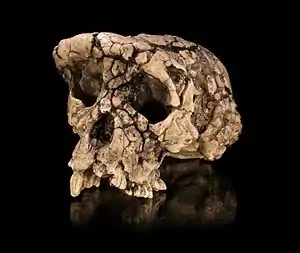 |
TM 266 (Toumai) | 7.00-6.00[2] | Sahelanthropus tchadensis | 2001 | Chad | Michel Brunet, Alain Beauvilain, Fanone Gongdibe, Mahamat Adoum and Ahounta Djimdoumalbaye | N'Djamena (Çad), BEAC |
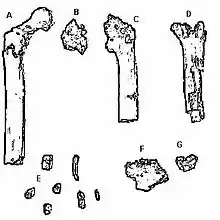 |
BAR 1000'00 | 6.1 - 5.7[3] | Orrorin tugenensis | 2000 | Kenya | Martin Pickford, Kiptalam Cheboi, Dominique Gommery, Pierre Mein, Brigitte Senut | |
 |
ALA-VP 1/20[4] | 5.65±0.150 | Ardipithecus kadabba | 1997 | Ethiopia | Yohannes Haile-Selassie | |
Pliyosen
5.3 milyon - 2.58 milyon önce
| Resim | Ad | Yaş | Tür | Keşif yılı | Ülke | Keşfeden kişi(ler) | Şu an bulunduğu yer |
|---|---|---|---|---|---|---|---|
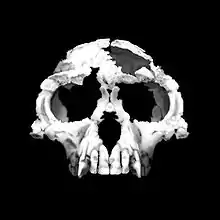 |
Ardi | 4.40[5] | Ardipithecus ramidus | 1994 | Ethiopia | Yohannes Haile-Selassie | |
 |
Lothagam mandible (KNM-LT 329)[6] | 4.60±0.40[7] | Australopithecus anamensis or undetermined Hominidae | 1967 | Kenya | Arnold Lewis,[8] Bryan Patterson[9][10][11] | |
| KNM-TH 13150 | 4.70±0.55[12] | Australopithecus anamensis | 1984 | Kenya | Kiptalam Cheboi[9] | ||
.JPG.webp) |
KNM-KP 271 | 4.00[13] | Australopithecus anamensis | 1965 | Kanapoi, Kenya | Bryan Patterson[9] | |
| Laetoli Footprints | 3.70 | Bipedal hominin | 1976 | Tanzania | Mary Leakey | ||
 |
LH 4 | 3.40±0.50 | Australopithecus afarensis | 1974 | Laetoli, Tanzania | Mary Leakey[14] | |
| KSD-VP-1/1 (Kadanuumuu) | 3.58 | Australopithecus afarensis | 2005 | Ethiopia | Yohannes Haile-Selassie | ||
| KT-12/H1 (Abel) | 3,50 | Australopithecus bahrelghazali | 1995 | Chad | Mamelbaye Tomalta and Michel Brunet | N'Djamena (Chad), BEAC | |
.JPG.webp) |
KNM-WT 40000 (Flat Faced Man)[15] | 3,50 | Kenyanthropus platyops | 1999 | Lake Turkana (West Lake Turkana), Kenya | Justus Erus and Meave Leakey[16] | |
| BRT-VP-3/14 | 3.40±0.10 | Australopithecus deyiremeda | 2015 | Ethiopia | Yohannes Haile-Selassie[17] | ||
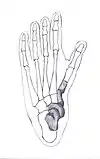 |
Stw 573 (Little foot) | 3.67 | Australopithecus prometheus(?) | 1994 | Sterkfontein, Güney Afrika Cumhuriyeti | Ronald J. Clarke | |
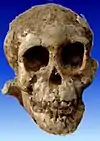 |
DIK-1 (Selam) | 3.30 | Australopithecus afarensis | 2000 | Ethiopia | Zeresenay Alemseged | |
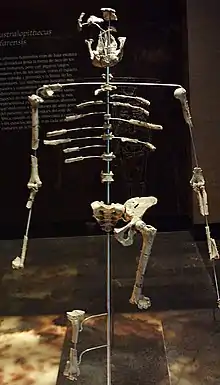 |
AL 288-1 (Lucy) | 3.20 | Australopithecus afarensis | 1974 | Ethiopia | Tom Gray, Donald Johanson, Yves Coppens and Maurice Taieb | Etiyopya Milli Müzesi |
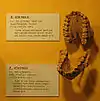 |
AL 200-1 | 3.10±0.10 | Australopithecus afarensis | 1975 | Afar Region, Ethiopia | Donald Johanson Yves Coppens and Maurice Taieb | |
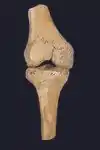 |
AL 129-1 | 3.10±0.10 | Australopithecus afarensis | 1973 | Afar Region, Ethiopia | Donald Johanson | |
 |
AL 444-2[18] | 3.00 | Australopithecus afarensis | 1992 | Afar Region, Ethiopia | Yoel Rak | |
| [19] | LD 350-1 | 2.775±0.025[20] | Homo(?) | 2013 | Ethiopia | Chalachew Seyoum | |
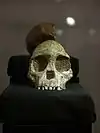 |
Taung Child 1 | 3.03 - 2.61 | Australopithecus africanus | 1924 | Buxton-Norlim Limeworks, South Africa | Raymond Dart | University of the Witwatersrand |
Pleistosen
Ön Paleolitik: 2.58 milyon - 300.000 yıl önce
| Resim | İsim | Yaş | Tür | Keşif yılı | Ülke | Keşfeden | Bulunduğu yer |
|---|---|---|---|---|---|---|---|
 |
KNM-WT 17000 (The Black kafatası) |
2.50 | Paranthropus aethiopicus | 1985 | Kenya | Alan Walker | |
.jpg.webp) |
BOU-VP-12/130[21] | 2.50 | Australopithecus garhi | 1997 | Ethiopia | Yohannes Haile-Selassie | |
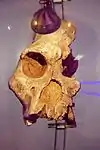 |
STS 71[22] | 2.61 -2.07 | Australopithecus africanus | 1947 | Güney Afrika Cumhuriyeti | Robert Broom and John T. Robinson | Distong Doğa Tarihi Millî Parkı |
 |
STS 52 | 2.61 - 2.07 | Australopithecus africanus | 1947 | Güney Afrika Cumhuriyeti | Robert Broom | Distong Doğa Tarihi Millî Parkı |
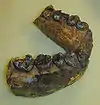 |
UR 501 (Uraha jawbone) | 2.40±0.10 | Homo rudolfensis[23] | 1991 | Malawi | Tyson Msiska, Timothy Bromage, Friedemann Schrenk | |
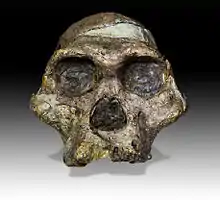 |
STS 5 (Mrs. Ples) (STS 14)[24] |
2.07[25] | Australopithecus africanus | 1947 | Güney Afrika Cumhuriyeti | Robert Broom | Distong Doğa Tarihi millî Parkı |
| DNH 134 (Simon)[26] | 2.04[26] | Homo erectus | 2015 | Güney Afrika Cumhuriyeti | Andy Herries' team (excavated by Richard Curtis, Andy Herries, Angeline Leece; reconstructed by Jesse Martin) | Witwatersrand Üniversitesi | |
 |
Wushan Man | 2.04 - 2[27] | Homo erectus | 1985 | Longgupo, Zhenlongping köyü, Miaoyu kasabası [28] | Three Gorges Müzesi | |
| DNH 152 (Khethi) | 2.04-1.95 | Paranthropus robustus | 2018 | Güney Afrika Cumhuriyeti | Andy Herries'in takımı | Witwatersrand Üniversitesi | |
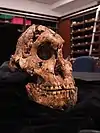 |
DNH 7 (Eurydice)[29] |
2.04 - 1.95 | Paranthropus robustus | 1994 | Güney Afrika Cumhuriyeti | R. Smith and André Keyser | Witwatersrand Üniversitesi |
 |
TM 1517[30] | unknown | Paranthropus robustus | 1938 | Güney Afrika Cumhuriyeti | Gert Terblanche | Distong Doğa Tarihi millî Parkı |
 |
MH1 (Karabo)[31][32] | 1.98[33] | Australopithecus sediba | 2008 | Güney Afrika Cumhuriyeti | Lee R. Berger | Witwatersrand Üniversitesi |
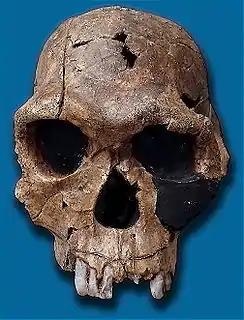 |
KNM-ER 1813 | 1.90 | Homo habilis | 1973 | Kenya | Kamoya Kimeu | |
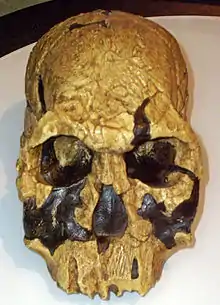 |
KNM-ER 1470 | 1.90 | Homo rudolfensis | 1972 | Kenya | Bernard Ngeneo[34] | |
 |
SK 48 | 2.25 - 1.80 | Paranthropus robustus | 1948 | Güney Afrika Cumhuriyeti | Robert Broom | Ditsong National Museum of Natural History |
 |
SK 46[35] | 2.25 - 1.80 | Paranthropus robustus | 1949 | Güney Afrika Cumhuriyeti | Robert Broom | Ditsong National Museum of Natural History |
 |
SK 847[36] | 2.25 -1.80 | Homo habilis | 1949 | Güney Afrika Cumhuriyeti | Ditsong National Museum of Natural History | |
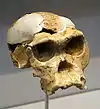 |
OH 24 (Twiggy)[37] |
1.80 | Homo habilis | 1968 | Tanzania | Peter Nzube | |
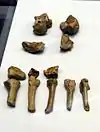 |
OH 8[38] | 1.80 | Homo habilis | 1960 | Olduvai, Tanzania | ||
.jpg.webp) |
D2700 (Dmanisi kafatası 3) | 1.81±0.40[39] | Homo erectus | 2001 | Dmanisi, Georgia | David Lordkipanidze and Abesalom Vekua | |
 |
D3444 (Dmanisi kafatası 4) | 1.81±0.40 | Homo erectus | 2003 | Dmanisi, Georgia | David Lordkipanidze | |
| Dosya:Kafatası in dmanisi archaeological site.JPG | D4500 (Dmanisi kafatası 5) | 1.81±0.40 | Homo erectus | 2005 (published in 2013) | Dmanisi, Georgia | David Lordkipanidze | |
| KNM-ER 62000–62003[40] | 1.84±0.60 | Homo rudolfensis | 2012 | Koobi Fora, Kenya | Meave Leakey's team | ||
| Dosya:Paranthropus boisei kafatası.jpg | OH 5 (Zinj or nutcracker man) |
1.75 | Paranthropus boisei | 1959 | Tanzania | Mary Leakey | |
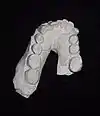 |
OH 7 | 1.75 | Homo habilis | 1960 | Tanzania | Jonathan Leakey | |
| StW 53 | 1.8 - 1.6[25] | variously A. africanus, H. habilis, H. gautengensis | 1976 | Sterkfontein, Güney Afrika Cumhuriyeti | A. R. Hughes | University of the Witwatersrand | |
 |
KNM-ER 1805 | 1.74 | Homo habilis | 1973/4 | Kenya | Paul Abell | |
| Yuanmou Man | 1.70 or 0.60–0.50 (disputed)[41] |
Homo erectus | 1965 | Çin | Fang Qian | ||
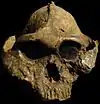 |
KNM-ER 406 | 1.70 | Paranthropus boisei | 1969 | Kenya | Richard Leakey | |
 |
KNM-ER 732[42] | 1.70 | Paranthropus boisei | 1970 | Kenya | Richard Leakey | |
 |
KNM-ER 23000[43] | 1.70 | Paranthropus boisei | 1990 | Koobi Fora, Kenya | Benson Kyongo | |
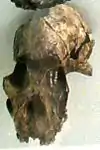 |
KNM-WT 17400[44][45] | 1.70 | Paranthropus boisei | Not known[46] | Lake Turkana (West Lake Turkana) Kenya | unknown[46] | National Museums of Kenya, Nairobi (Kenia) |
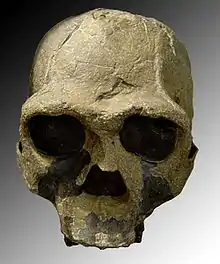 |
KNM-ER 3733 | 1.63±0.15[47] | Homo ergaster (a.k.a. African Homo erectus) | 1975 | Kenya | ||
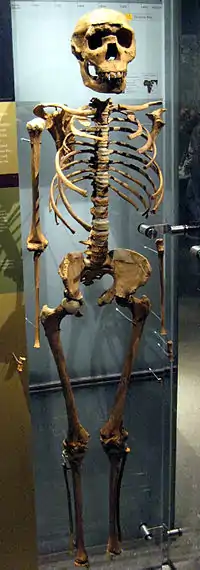 |
KNM-WT 15000 (Turkana Boy) |
1.60 | Homo ergaster (a.k.a. African Homo erectus) | 1984 | Lake Turkana (West Lake Turkana), Kenya | Kamoya Kimeu | Kenya National Museum |
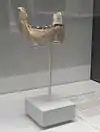 |
Peninj Mandible | 1.50 | Paranthropus boisei | 1964 | Tanzania | Richard Leakey | |
 |
KNM-ER 992 | 1.50 | Homo ergaster (a.k.a. African Homo erectus) | 1971 | Kenya | Richard Leakey | |
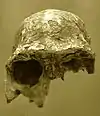 |
KNM-ER 3883 | 1.57±0.08 | Homo erectus | 1976 | Kenya | Richard Leakey | |
 |
Mojokerto 1 (Mojokerto child) |
1.43±0.10 | Homo erectus | 1936 | Indonesia | Andojo, G.H.R. von Koenigswald | |
| Dosya:Konso kafatası.jpg | KGA 10-525[48][49] | 1.40 | Paranthropus boisei | 1993 | Konso-Gardula, Ethiopia | A. Amzaye | |
 |
OH 9 (Chellean Man)[50] |
1.40 | Homo erectus | 1960 | Olduvai, Tanzania | Louis Leakey | |
 |
Atapuerca Jawbone[51] | 1.20 | Homo sp. | 2008 | İspanya | Eudald Carbonell | Museo de la Evolución Humana, Burgos (İspanya) |
 |
Kocabas | 1.10[52] | Homo erectus [53] | 2002 | Türkiye | M. Cihat Alçiçek | |
 |
Daka | 1.00 | Homo erectus | 1997 | Ethiopia | Henry Gilbert | |
.jpg.webp) |
Sangiran 4 | 1.00 | Homo erectus | 1939 | Indonesia | G.H.R. von Koenigswald | |
.jpg.webp) |
Sangiran 2 | 1.15±0.45 | Homo erectus | 1937 | Indonesia | G.H.R. von Koenigswald | |
 |
Madam Buya[54] | 1.00 | Homo heidelbergensis or Homo erectus |
1997 | Eritrea | Ernesto Abbate | National Museum of Eritrea |
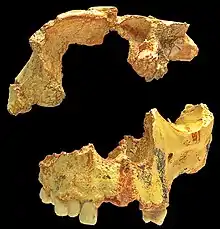 |
ATD6-15 and ATD6-69
(Niño de la Gran Dolina 342) |
0.900[55] | Homo antecessor or Homo erectus |
1994 | İspanya | Bermúdez & Arsuaga | Museo de la Evolución Humana, Burgos (Spain) |
| Trinil 2 Pithecanthropus-1 or Java Man[56] |
0.850±0.150 | Homo erectus | 1891 | Indonesia | Eugène Dubois | Naturalis Biodiversity Center, Leiden | |
 |
Ternifine 2-3 now Tighennif[57] | 0.70 | Homo erectus | 1954 | Algeria | C. Arambourg & B. Hoffstetter | |
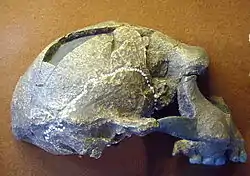 |
Sangiran 17[58] | 0.70 | Homo erectus | 1969 | Indonesia | S. Sartono | |
| Dosya:Peking Man kafatası (replica) presented at Paleozoological Museum of China.jpg | Peking Man | 0.73±0.50[59] | Homo erectus | 1921 | Çin | Davidson Black | Lost/stolen |
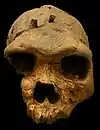 |
Bodo[60] | 0.600 | Homo heidelbergensis or Homo erectus |
1976 | Ethiopia | A. Asfaw | |
.JPG.webp) |
Mauer 1 (Heidelberg Man) |
0.50 | Homo heidelbergensis | 1907 | Almanya | Daniel Hartmann | Heidelberg University |
 |
Saldanha man[61] | 0.50 | Homo rhodesiensis | 1953 | Güney Afrika Cumhuriyeti | ||
| Boxgrove Man | 0.50[62] | Homo heidelbergensis | 1994 | UK | Natural History Museum | ||
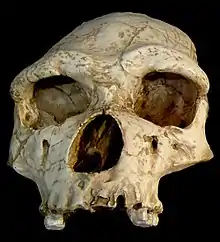 |
Arago 21 (Tautavel Man) |
0.45 | Homo erectus | 1971 | Fransa | Henry de Lumley | |
| Argil Ceprano Man[63][64] |
0.450±0.050 | Homo cepranensis /Homo heidelbergensis |
1994 | Ceprano, Italy | Italo Biddittu | Servizio di antropologia, Soprintendenza ai beni culturali, Regione Lazio, Italy | |
 |
Gawis cranium | 0.350±0.015 | Homo erectus/Homo sapiens | 2006 | Ethiopia | Asahmed Humet | |
 |
kafatası 5 (Miguelón) | 0.400 | Homo heidelbergensis | 1992 | İspanya | Bermúdez, Arsuaga & Carbonell | Museo de la Evolución Humana, Burgos (Spain) |
 |
Aroeira 3 | 0.40 | Homo heidelbergensis | 2014 | Portekiz | João_Zilhão | Museu Nacional de Arqueologia, Lisbon |
| Dosya:Sale kafatası.jpg | Salé[65][66][67] | 0.40 | Homo rhodesiensis | 1971 | Morocco | A quarry worker | |
 |
Swanscombe Man[68] | 0.40 | Homo Neanderthalensis | 1935, 1936, 1955 | Swanscombe | Alvan T Marston, John J Wymer and Adrian Gibson | Natural History Museum |
 |
Ndutu[69] | 0.40 | Homo rhodesiensis,[70][71] late Homo erectus,[72] or early Homo sapiens[73] | 1973 | Tanzania | A.A. Mturi | |
| [74] | Hexian cranial vault (PA 830)[75][76] | 0.412±0.025 | Homo erectus | 1980 | Hexian, Çin | ||
 |
Steinheim kafatası | 0.35 | Homo heidelbergensis | 1933 | Almanya | ||
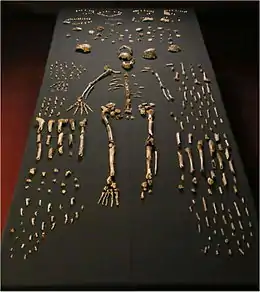 |
Dinaledi Chamber hominins | 0.325±0.090[77] | Homo naledi | 2013 | Güney Afrika Cumhuriyeti | Rick Hunter and Steven Tucker | University of the Witwatersrand (South Africa) |
mOrta Paleolitik: 300.000 - 50.000 yıl önce
| İsim | Yaş | Tür | Bulunuş tarihi |
Ülke | Keşfeden kişiler | |
|---|---|---|---|---|---|---|
| Petralona 1 görseli: Modern Human Origins |
Petralona 1 | 250 bin - 500 bin | Homo heidelbergensis | 1960 | Yunanistan | |
| Ngandong 7 | 250 bin | Homo erectus | 1931 | Endonezya | C. ter Haar ve G. H. R. von Koenigswald | |
| Altamura Adamı | 250k | Homo neanderthalensis | İtalya | |||
| Bontnewydd paleolitik sit alanı | Bontnewydd (Pontynewydd) | 230k | Homo neanderthalensis | 1981 | İngiltere | |
| Dali görseli: Modern Human Origins |
Dali (fosil) | 209 bin | Homo Erectus veya Homo sapiens |
1978 | Çin | Shuntang Liu |
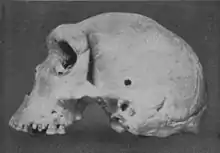 |
Broken Hill 1 (Kabwe kafatası kemikleri veya Rodezya Adamı) |
200 bin - 300 bin | Homo rhodesiensis | 1921 | Zambiya | Tom Zwiglaar |
| Omo 1 görseli: Modern Human Origins |
Omo 1 | 190 bin | Homo sapiens | 1967 | Etyopya | Richard Leakey |
| Omo II görseli: Modern Human Origins |
Omo 2 | 190 bin | Homo rhodesiensis | Etiyopya | Richard Leakey | |
| Herto kafatası görseli: ABC Science23 Kasım 2010 tarihinde Wayback Machine sitesinde arşivlendi. |
Herto kalıntıları | 160 bin | Homo sapiens idaltu | 1997 | Etyopya | Tim White |
| Jebel Irhoud 1 kafatası görseli: Max Planck Enstitüsü |
Jebel Irhoud 1 | 160 bin | Homo sapiens | 1991 | Fas | |
| Jebel Irhoud 2 | 160 bin | HHomo sapiens | 1991 | Fas | ||
| Jebel Irhoud 3 alt çene kemiği görseli: PhysOrg.com6 Haziran 2011 tarihinde Wayback Machine sitesinde arşivlendi. |
Jebel Irhoud 3 | 160 bin | Homo sapiens | 1991 | Fas | |
| Jebel Irhoud 4 | 160 bin | Homo sapiens | 1991 | Fas | ||
| Tabun 1 görseli: Modern Human Origins |
Tabun C1 | 120 bin | Homo neanderthalensis | 1967 | İsrail | Arthur Jelinek |
| Krapina C görseli: Modern Human Origins |
Krapina | 100 bin - 127 bin [78] | Homo neanderthalensis | 1899 | Hırvatistan | Dragutin Gorjanović-Kramberger |
| Qafzeh VI görseli: Modern Human Origins |
Qafzeh 6 | 90 bin - 100 bin[78] | Homo sapiens | 1930 | İsrail | R. Neuville M Stekelis |
 |
Qafzeh IX | 90 bin - 100 bin[78] | Homo sapiens[79] | 1933 | İsrail | T. McCown ve H. Moivus, Jr. |
| Qafzeh VI görseli: Modern Human Origins |
Qafzeh VI | 90 bin - 100 bin[78] | Homo sapiens | 1933 | İsrail | T. McCown ve H. Moivus, Jr. |
| Scladena | 80 bin - 127 bin[78] | Homo neanderthalensis | Belçika | |||
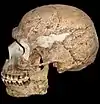 |
Skhul V | 80 bin - 120 bin | Homo sapiens | 1933 | İsrail | T. McCown ve H. Moivus, Jr. |
| Skhul IX | 80 bin - 120 bin | Homo sapiens | İsrail | |||
| Klasies görseli: Modern Human Origins |
Klasies nehri mağaraları | 75 bin - 125 bin | Homo sapiens | 1960 | Güney Afrika | Ray Inskeep, Robin Singer, John Wymer, Hilary Deacon |
| Obi-Rakhmat 1[80] | 75 bin [78] | Homo neanderthalensis | 2003 | Özbekistan | ||
| Teşik-Taş kafatası[81] | 70 bin | Homo neanderthalensis | 1938 | Özbekistan | A. Okladnikov | |
| Dosya:Ferrassie kafatası.jpg | La Ferrassie 1 | 70 bin | Homo neanderthalensis | 1909 | Fransa | R. Capitan ve D. Peyrony |
| Saccopastore 1 görseli: Modern Human Origins |
Saccopastore 1 | 60 bin | Homo neanderthalensis | İtalya | ||
| Shanidar 1 | 60 bin - 80 bin | Homo neanderthalensis | 1961 | Irak | Ralph Solecki | |
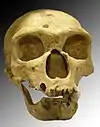 |
La Chapelle-aux-Saints 1 | 60 bin | Homo neanderthalensis | 1908 | Fransa | A. ve J. Bouyssonie ve L. Bardon |
| Amud 7 görseli: Modern Human Origins |
Amud 7 | 50 bin - 60 bin | Homo neanderthalensis | İsrail |
Üst Paleolitik: 50.000 - 10.000 yıl önce
| İsim | Yaş | Tür | Bulunuş tarihi |
Ülke | Keşfeden kişiler | |
|---|---|---|---|---|---|---|
| Sidrón Mağarası | 49 bin | Homo neanderthalensis | 1994 | İspanya | ||
| La Quina 5 | 45 bin - 60 bin[78] | Homo neanderthalensis | Fransa | |||
| La Quina 18 | 45 bin - 60 bin[78] | Homo neanderthalensis | Fransa | |||
| Kents Cavern Mağaraları | 41 bin - 45 bin | Homo sapiens | 1927 | İngiltere | ||
| Amud 1 görseli: Modern Human Origins |
Amud 1 | 41 bin [82] | Homo neanderthalensis | İsrail | ||
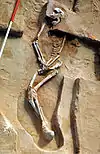 |
Mungo Adamı | 40 bin - 60 bin | Homo sapiens | 1974 | Avustralya | |
| Mount Circeo 1 görseli: Modern Human Origins |
Mt. Circeo 1 | 40 bin - 60 bin | Homo neanderthalensis | 1939 | İtalya | Prof. Blanc |
| Neanderthal 1 görseli: Modern Human Origins |
Neanderthal 1 | 40 bin | Homo neanderthalensis | 1856 | Almanya | Johann Carl Fuhlrott |
| Hominin ayak baş parmağı kemiği | 40 bin | Homo ? (muhtemelen Neanderthal ile Denisova melezi) | 2011 | Rusya | ||
| Dosya:Hofmeyr kafatası.jpg | Hofmeyr kafatası | 36 bin | Homo sapiens | 1952 | Güney Afrika | |
| Peştera cu Oase görseli30 Eylül 2012 tarihinde Wayback Machine sitesinde arşivlendi. | Peştera cu Oase | 36 bin | Homo sapiens | 2002 | Romanya | |
| Paviland'ın Kırmızı Leydisi | 33 bin | Homo sapiens | 1823 | İngiltere | William Buckland | |
| Yamashita Mağara Adamı | 32 bin | Homo sapiens | 1962 | Japonya | ||
| 14 Mart 2012 tarihinde Wayback Machine sitesinde arşivlendi. | Engis | 30 bin-50 bin [78] | Homo neanderthalensis | 1829 | Belçika | Philippe-Charles Schmerling |
| Gibraltar 1 görseli: Modern Human Origins |
Cebelitarık 1 | 30 bin-50 bin [78] | Homo neanderthalensis | 1848 | Cebelitarık | Lieutenant Flint |
| Le Moustier | 30 bin-50 bin | Homo neanderthalensis | 1909 | Fransa | ||
| Denisova dişleri | 30 bin - 50 bin | Homo ? | 2000 | Rusya | ||
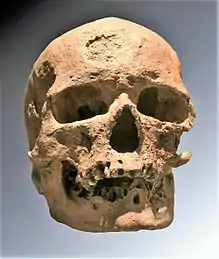 |
Cro-Magnon 1 | 30 bin | Homo sapiens | 1868 | Fransa | Louis Lartet |
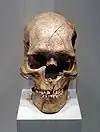 |
Combe Capelle | 30 bin - 35 bin | Homo sapiens | 1909 | Fransa | O. Hauser |
| NG 6 | 27 bin - 53 bin | Homo erectus | 1931 | Endonezya | C. ter Haar ve GHR von Koenigswald | |
| Predmosti 3 görseli: Modern Human Origins |
Predmost 3 | 26 bin | Homo sapiens | 1894 | Çek Cumhuriyeti | K.J. Maska |
| 11 Kasım 2013 tarihinde Wayback Machine sitesinde arşivlendi. | Eel Point (Eel Burnu) | 24 bin | Homo sapiens | 1997 | İngiltere | |
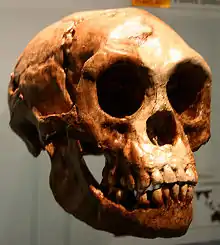 |
LB 1 (Hobbit) | 18 bin | Homo floresiensis | 2003 | Endonezya | Peter Brown |
| Minatogawa 1 images at Modern Human Origins |
Minatogawa 1 | 16 bin - 18 bin | Homo sapiens | 1970 | Japonya | |
| Tandou | 15 bin | Homo sapiens | 1967 | Avustralya | Duncan Merrilees | |
| 9 Şubat 2012 tarihinde Wayback Machine sitesinde arşivlendi. | Gough's Mağarası | 14.7 bin | Homo sapiens | 1927–1968 | İngiltere | |
| Iwo Eleru kafatası | 13 bin[83] | Homo rhodesiensis | 1965 | Nijerya | ||
| Cerro Sota 2 | 11 bin | Homo sapiens | 1936 | Şili | Junius Bird | |
| Wadjak 1 | 10 bin - 12 bin | Homo sapiens | 1888 | Endonezya | Eugene Dubois |
Holosen
Mezolitik / Neolitik: 10.000 - 5.000 yıl önce
| İsim | Yaş | Tür | Bulunuş tarihi |
Ülke | Keşfeden kişiler | |
|---|---|---|---|---|---|---|
| La Brea Kadını | yaklaşık 10 bin | Homo sapiens | 1914 | ABD | ||
| Cheddar Adamı | 9 bin | 1903 | İngiltere | |||
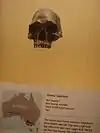 |
Kow Swamp 1 | 9 bin - 13 bin | Homo sapiens | 1968 | Avustralya | A.G. Thorne |
| Afalou 13 | 8 bin - 12 bin | Homo sapiens | 1920 | Cezayir | C. Arambourg | |
| Wadi Halfa 25 | 8 bin - 12 bin | Homo sapiens | 1963 | Sudan | G. Armelagos, E. Ewing, D. Greene | |
| Wadi Kubbaniya | 8 bin - 20 bin | Homo sapiens | 1982 | Mısır | Fred Wendorf | |
| Lo 4b | 6 bin - 9 bin | Homo sapiens | 1965 | H. Robbins B.M. Lynch | ||
| Tepexpan Adamı | 5 bin - 11 bin | Homo sapiens | 1947 | Meksika | H. de Terra | |
| SDM 16704 | 4.9 bin - 11.8 bin | Homo sapiens | 1929 | ABD | M.J. Rogers | |
Fosil katalog isimlerinde kullanılan kısaltmalar
- AL - Afar Bölgsi, Etiyopya
- ARA-VP - Aramis Omurgalı Paleontolojisi, Etiyopya
- BOU-VP - Bouri Omurgalı Paleontolojisi, Etiyopya
- ER - East (Gölü) Rudolf, Kenya
- KGA - Konso-Gardula, Etiyopya
- KNM - Kenya Ulusal Müzesi
- KP - Kanapoi, Kenya
- OH - Olduvai Hominid, Tanzanya
- SK - Swartkrans, Güney Afrika
- Sts, Stw - Sterkfontein, Güney Afrika
- TM - Transvaal Müzesi, Güney Afrika
- TM - Toros-Menalla, Çad
- WT - West (Gölü) Turkana, Kenya
Ayrıca bakınız
- İnsanın evrimi
- Fosil primatların listesi
- Fosil siteler listesi
- Önemli fosillerin listesi
- Ara fosil listesi
- Paleoantropoloji
- En son ortak ata
Ek okuma
- Gibbons, Ann. İlk İnsan: Eski atalarımızı keşfetme yarışı . Anchor Books (2007). ISBN 978-1-4000-7696-3
- Hartwig, Walter, ed (2002. 2004'te tekrar basıldı). Primat fosilleri. Cambridge University Press. ISBN 978-0-521-08141-2.
- Johanson, Donald & Wong, Kate. Lucy'nin Mirası: İnsanın Kökenini Arayış. Three Rivers Press (2009). ISBN 978-0-307-39640-2
- Jones, Steve; Martin, Robert D.; Pilbeam, David R (Editörler). (1994). İnsan Evrimi Cambridge Ansiklopedisi. Cambridge University Press. ISBN 978-0-521-46786-5.(Not: bu kitap genel olarak primatların evrimi hakkında çok yararlı ve insan evrimi hakkında dikkata değer bilgiler içermektedir. Bunun yanı sıra fosil tarihçesini de yer vermektedir).
- Leakey, Richard & Lewin, Roger. İnsanın Kökeni: Bizi insan yapan nedir?. Little, Brown and Company (1992). ISBN 0-316-90298-5
- Lewin, Roger. Kemikleri Tartışmak: İnsanın Kökeni Arayışında Tartışmalar. Penguin Books (1987). ISBN 0-14-022638-9
- Morwood, Mike & van Oosterzee, Penny. Yeni Bir İnsan: Flores, Endonezyalı 'Hobbitin' Şaşırtıcı Keşfi ve Tuhaf Hikayesi. Smithsonian Books (2007). ISBN 978-0-06-089908-0
- Oppenheimer, Stephen. Cennetin Ötesinde: Dünya İnsanları. Constable (2003). ISBN 1-84119-697-5
- Roberts, Alice. İnsanın İnanılmaz seyahati: Gezegenimize Nasıl Dağıldığımızın Hikayesi. Bloomsbury (2009). ISBN 978-0-7475-9839-8
- Shreeve, James. Neandertal Bilmecesi: Modern İnsanın Kökenini ve Gizemini Çözmek. Viking (1996). ISBN 0-670-86638-5
- Stringer, Chris. Türlerimizin Kökeni. Allen Lane (2011). ISBN 978-1-846-14140-9
- Stringer, Chris & Andrews, Peter. İnsanın Evriminin Tüm Dünyası . Thames and Hudson (2005). ISBN 0-500-05132-1
- Stringer, Chris & McKie, Robin. Afrika'dan Çıkış: Modern İnsanın Kökeni. Jonathan Cape (1996). ISBN 0-224-03771-4
- Van Oosterzee, Penny. Pekin Adamının Hikayesi. Allen & Unwin (1999). ISBN 1-86508-632-0
- Walker, Allan & Shipman, Pat. Kemiklerin Bilgeliği: İnsanın Kökeni Aramak. Weidenfeld ve Nicholson (1996). ISBN 0-297-81670-5
- Wade, Nicholas. Şafak Sökmeden Önce: Atalarımızın Kayıp Tarihini Kurtarmak. Penguin Press (2006). ISBN 978-0715636589
- Weiss, ML, ve Mann, AE (1985). İnsan Biyolojisi ve Davranışları: Antropolojik bir bakış açısı (4. bs.). Boston:. Little Brown ISBN 978-0-673-39013-4 (Not: Bu kitap, insan ve insan olmayan primatların evrimi ile fosil tarihlerini çok anlaşılabilir açıklamalarını içermektedir).
- Wells, Spencer. İnsanın Yolculuğu: Genetik Bir Odisee . Allen Lane / Penguin Press (2002). ISBN 0-713-99625-0
Kaynakça
- "Prominent Hominid Fossils". 31 Mart 2016 tarihinde kaynağından arşivlendi. Erişim tarihi: 31 Ağustos 2006.
- Brunet, Michel; Guy, Franck; Pilbeam, David; Mackaye, Hassane Taisso; Likius, Andossa; Ahounta, Djimdoumalbaye; Beauvilain, Alain; Blondel, Cécile; Bocherens, Hervé (2002). "A new hominid from the Upper Miocene of Chad, Central Africa". Nature. 418 (6894). ss. 145-51. Bibcode:2002Natur.418..145B. doi:10.1038/nature00879. PMID 12110880.
- "Bar 10200'". Smithsonian National Museum of Natural History. 23 Ocak 2010. 2 Haziran 2010 tarihinde kaynağından arşivlendi. Erişim tarihi: 27 Temmuz 2012.
- "Ardipithecus kadabba". efossils. 11 Mayıs 2014 tarihinde kaynağından arşivlendi. Erişim tarihi: 26 Mart 2015.
- Amos, Jonathan (1 Ekim 2009). "Fossil finds extend human story". BBC News. 25 Ağustos 2017 tarihinde kaynağından arşivlendi. Erişim tarihi: 28 Mart 2012.
- . doi:10.4207/PA.2015.ART94. Eksik ya da boş
|başlık=(yardım). "once considered plausible candidates for status as the earliest hominin (e.g., Kramer 1986; Ward and Hill 1987). Recent fieldwork, though, has lessened the relevance of these fossils by recovering samples from horizons more than two million years earlier. Yet despite the increase of comparative samples, these two mandibular fragments remain difficult to diagnose. Here we consider the morphology and dental metrics of these two specimens in comparison to the larger samples of Miocene and early Pliocene hominins recovered during the last fifteen years. We show, based on molar size, that KNM-TH 13150 is consistent with the hypodigm of Ardipithecus, while the Lothagam mandible is not consistent with Ardipithecus in its molar dimensions. These results have important biogeographic implications and hint at a more complex Early Pliocene hominin phylogeny than previously appreciated." - McDougall, I.A.N.; Craig, Feibel (1999). "Numerical age control for the Miocene-Pliocene succession at Lothagam, a hominoid-bearing sequence in the northern Kenya Rift". Journal of the Geological Society. 156 (4). ss. 731-45. Bibcode:1999JGSoc.156..731M. doi:10.1144/gsjgs.156.4.0731.
- Bernard Wood, Wiley-Blackwell Encyclopedia of Human Evolution (2011), 887 4 Haziran 2020 tarihinde Wayback Machine sitesinde arşivlendi..
- Hill, Andrew; Ward, Steven (1988). "Origin of the Hominidae: the record of African large hominoid evolution between 14 My and 4 My". Yearbook of Physical Anthropology. 31 (59). ss. 49-83. doi:10.1002/ajpa.1330310505.
- Patterson B, Behrensmeyer AK, Sill WD (Haziran 1970). "Geology and fauna of a new Pliocene locality in north-western Kenya". Nature. 226 (5249). ss. 918-21. Bibcode:1970Natur.226..918P. doi:10.1038/226918a0. PMID 16057594.
- "Lothagam mandible fragment". 16 Temmuz 2011 tarihinde kaynağından arşivlendi. Erişim tarihi: 28 Mart 2012.
- Ward, Steven; Hill, Andrew (1987). "Pliocene hominid partial mandible from Tabarin, Baringo, Kenya". American Journal of Physical Anthropology. 72 (1). ss. 21-37. doi:10.1002/ajpa.1330720104. PMID 3103460.
- Heslip, Steven (2001). "Australopithecus anamensis". 8 Haziran 2011 tarihinde kaynağından arşivlendi. Erişim tarihi: 28 Mart 2012.
- "Oldupai". Ntz.info. 18 Ekim 2007 tarihinde kaynağından arşivlendi. Erişim tarihi: 15 Ekim 2012.
- Anthropology, The University of Texas at Austin, Department of. "Kenyanthropus platyops: KNM WT 40000". www.efossils.org. 16 Haziran 2012 tarihinde kaynağından arşivlendi. Erişim tarihi: 4 Haziran 2020.
- "KNM-WT 40000". 23 Ocak 2010. 7 Haziran 2010 tarihinde kaynağından arşivlendi. Erişim tarihi: 4 Haziran 2020.
- "New human ancestor species from Ethiopia lived alongside Lucy's species". www.sciencedaily.com. 27 Mayıs 2015. 28 Mayıs 2015 tarihinde kaynağından arşivlendi. Erişim tarihi: 28 Mayıs 2015.
- http://www.modernhumanorigins.net/al444-2.html 29 Ağustos 2010 tarihinde Wayback Machine sitesinde arşivlendi. Image at Modern Human Origins
- http://www.eurekalert.org/multimedia/pub/87535.php 4 Haziran 2020 tarihinde Wayback Machine sitesinde arşivlendi. Image at Eurekalert
-
Villmoare, Brian; Kimbel, William H.; Seyoum, Chalachew; Campisano, Christopher J.; DiMaggio, Erin N.; Rowan, John; Braun, David R.; Arrowsmith, J. Ramón; Reed, Kaye E. (20 Mart 2015). "Early Homo at 2.8 Ma from Ledi-Geraru, Afar, Ethiopia". Science. 347 (6228). ss. 1352-55. Bibcode:2015Sci...347.1352V. doi:10.1126/science.aaa1343. ISSN 0036-8075. PMID 25739410. Geçersiz
|doi-access=free(yardım): "The Gurumaha Tuff is radiometrically dated to 2.842±0.007 Ma, a date that is consistent with the normal magnetic polarity of the Gurumaha section, presumably the Gauss Chron. An upper bounding age for LD 350-1 is provided by an adjacent, downfaulted younger block that contains the 2.665±0.016 Ma Lee Adoyta Tuff. [...] the age of LD 350-1 can be further constrained by stratigraphic scaling. [...] Based on the current chronostratigraphic framework for Ledi-Geraru, we consider the age of LD 350-1 to be 2.80–2.75 Ma". - Bouri Vertebrate Paleontology "Australopithecus garhi: BOU-VP-12/130". efossils. 25 Haziran 2016 tarihinde kaynağından arşivlendi. Erişim tarihi: 13 Haziran 2016.
- http://humanorigins.si.edu/evidence/human-fossils/fossils/sts-71 4 Haziran 2020 tarihinde Wayback Machine sitesinde arşivlendi. Image at Smithsonian
- At the time of its discovery considered the oldest fossil evidence of genus Homo. Ramirez Rozzi, Fernando V.; Bromage, Tim; Schrenk, Friedemann (1997). "UR 501, the Plio-Pleistocene hominid from Malawi. Analysis of the microanatomy of the enamel". Comptes Rendus de l'Académie des Sciences - Series IIA - Earth and Planetary Science. Cilt 325. ss. 231-234. doi:10.1016/S1251-8050(97)88294-8.. Since the discovery of LD 350-1 (2.8 Ma, intermediate between Australopithecus and Homo) arguably demoted to the rank of second-oldest fossil of Homo.
- "Archived copy". 18 Ocak 2006 tarihinde kaynağından arşivlendi. Erişim tarihi: 11 Temmuz 2006. Image at Modern Human Origins. "Australopithecus africanus". Australian Museum. 20 Ocak 2011. 1 Temmuz 2015 tarihinde kaynağından arşivlendi. Erişim tarihi: 4 Haziran 2020.
- Herries, Andy I.R.; Shaw, John (2011). "Palaeomagnetic analysis of the Sterkfontein palaeocave deposits: Implications for the age of the hominin fossils and stone tool industries". Journal of Human Evolution. 60 (5). ss. 523-39. doi:10.1016/j.jhevol.2010.09.001. ISSN 0047-2484. PMID 21392817.
- Herries, Andy (2020). "Contemporaneity of Australopithecus, Paranthropus, and early Homo erectus in South Africa". Science. 368 (6486). ss. eaaw7293. doi:10.1126/science.aaw7293. PMID 32241925
|pmid=değerini kontrol edin (yardım). 30 Nisan 2020 tarihinde kaynağından arşivlendi. Erişim tarihi: 4 Haziran 2020. - "New human fossil find rewrites China's history -- china.org.cn". www.china.org.cn. 16 Şubat 2008 tarihinde kaynağından arşivlendi. Erişim tarihi: 11 Mayıs 2020.
- "Longgupo Pithecanthrope Site, Wushan Man, Human Fossil, Yangtze River". www.travelchinaguide.com. 21 Nisan 2002 tarihinde kaynağından arşivlendi. Erişim tarihi: 11 Mayıs 2020.
- "Modernhumanorigins.net". www.modernhumanorigins.net. 17 Haziran 2010 tarihinde kaynağından arşivlendi. Erişim tarihi: 18 Mart 2007.
- Department of Anthropology: The University of Texas at Austin. "Paranthropus robustus: TM 1517". 11 Mayıs 2013 tarihinde kaynağından arşivlendi. Erişim tarihi: 9 Haziran 2014.
- http://www.scientificamerican.com/article.cfm?id=south-african-hominin-fossil 13 Ocak 2012 tarihinde Wayback Machine sitesinde arşivlendi. MH1 image at Scientific American
- Juliet King (4 Haziran 2010). "Australopithecus sediba fossil named by 17-year-old Johannesburg student". Origins Centre. 25 Mart 2012 tarihinde kaynağından arşivlendi. Erişim tarihi: 9 Temmuz 2011.
- Jonathan, Amos (8 Eylül 2011). "African fossils put new spin on human origins story". http://www.sciencemag.org/site/extra/sediba/index.xhtml. BBC News. 23 Aralık 2018 tarihinde kaynağından arşivlendi. Erişim tarihi: 9 Eylül 2011.
|eser=dış bağlantı (yardım) - Mai, L.L., Owl, M.Y., & Kersting, M.P. (2005), p. 286
- "SK 46". 24 Ocak 2010. 7 Haziran 2010 tarihinde kaynağından arşivlendi. Erişim tarihi: 4 Haziran 2020.
- "Modernhumanorigins.net". www.modernhumanorigins.net. 27 Eylül 2007 tarihinde kaynağından arşivlendi. Erişim tarihi: 18 Mart 2007.
- http://humanorigins.si.edu/evidence/3d-collection/oh-24 4 Mart 2016 tarihinde Wayback Machine sitesinde arşivlendi. Image at Smithsonian
- http://www.modernhumanorigins.net/oh8.html 8 Aralık 2010 tarihinde Wayback Machine sitesinde arşivlendi. OH 8 image of foot at Modern Human Origins
- Lordkipanidze, D.; de Leon, Ponce; Margvelashvili, A.; Rak, Y.; Rightmire, G. P.; Vekua, A.; Zollikofer, C. P. E. (2013). "A Complete kafatası from Dmanisi, Georgia, and the Evolutionary Biology of Early Homo". Science. 342 (6156). ss. 326-31. doi:10.1126/science.1238484.
- Leakey MG, Spoor F, Dean MC, ve diğerleri. (Ağustos 2012). "New fossils from Koobi Fora in northern Kenya confirm taxonomic diversity in early Homo". Nature. 488 (7410). ss. 201-04. Bibcode:2012Natur.488..201L. doi:10.1038/nature11322. PMID 22874966.F
- "Inverted strata". 2 Ekim 2006 tarihinde kaynağından arşivlendi. Erişim tarihi: 4 Haziran 2020.
- Donald C. Johanson; Blake Edgar (1996). From Lucy to Language. New York: Simon & Schuster. s. 158.
- "Image at Smithsonian". 7 Mart 2016 tarihinde kaynağından arşivlendi. Erişim tarihi: 4 Haziran 2020.
- Leakey, R. E. F. y Walker, A. C. (1988). "New Australopithecus boisei specimens from East and West Lake Turkana, Kenya". American Journal of Physical Anthropology. 76 (1). ss. 1-24. doi:10.1002/ajpa.1330760102. ISSN 1096-8644. PMID 3136654.
- Grine, Frederick E. (2007). Grine, Frederick E. (Ed.). Evolutionary History of the "Robust" Australopithecines (İngilizce). Transaction Publishers. ss. 99, 185-86, 247. ISBN 978-0202365961. 7 Ekim 2019 tarihinde kaynağından arşivlendi. Erişim tarihi: 16 Şubat 2015.
- Wood, Bernard (2011). Wood, Bernard (Ed.). Wiley-Blackwell Encyclopedia of Human Evolution, 2 Volume Set (İngilizce). doi:10.1002/9781444342499. ISBN 978-1444342475. 7 Ekim 2019 tarihinde kaynağından arşivlendi. Erişim tarihi: 11 Mayıs 2014. Access to the references of this book 9 Eylül 2017 tarihinde Wayback Machine sitesinde arşivlendi..
- Lepre, C. J.; Kent, D. V. (2010). "New magnetostratigraphy for the Olduvai Subchron in the Koobi Fora Formation, northwest Kenya, with implications for early Homo". Earth and Planetary Science Letters. 290 (3–4). s. 362. Bibcode:2010E&PSL.290..362L. doi:10.1016/j.epsl.2009.12.032.. "paleo-magnetic results of this study delimit the age of KNM-ER 3733 to 1.78–1.48 Ma, making it one of the most securely dated fossils of early African H. erectus when compared to the oldest Homo fossils from Europe and Asia."
- Wood, Bernard A.; Constantino, Paul J. (28 Kasım 2007). "Paranthropus boisei: Fifty Years of Evidence and Analysis". Yearbook of Physical Anthropology. Cilt 50. ss. 109-10. doi:10.1002/ajpa.20732. PMID 18046746. 22 Eylül 2015 tarihinde kaynağından (PDF) arşivlendi. Erişim tarihi: 27 Temmuz 2015.
- Smithsonian National Museum of Natural History (24 Ocak 2010). "Konso KGA10-525". What does it mean to be human?. 7 Haziran 2010 tarihinde kaynağından arşivlendi. Erişim tarihi: 17 Şubat 2015.
- "Modernhumanorigins.net". www.modernhumanorigins.net. 17 Haziran 2010 tarihinde kaynağından arşivlendi. Erişim tarihi: 17 Mart 2007.
- Michael Hopkin (26 Mart 2008). "Fossil find is oldest European yet". Nature News. doi:10.1038/news.2008.691.
- Lebatard, Anne-Elisabeth; Alçiçek, M. Cihat; Rochette, Pierre; Khatib, Samir; Vialet, Amélie; Boulbes, Nicolas; Bourlès, Didier L; Demory, François; Guipert, Gaspard; Mayda, Serdar; Titov, Vadim V; Vidal, Laurence; De Lumley, Henry (2014). "Dating the Homo erectus bearing travertine from Kocabas (Denizli, Turkey) at at least 1.1 Ma". Earth and Planetary Science Letters. Cilt 390. ss. 8-18. Bibcode:2014E&PSL.390....8L. doi:10.1016/j.epsl.2013.12.031. Geçersiz
|doi-access=free(yardım) - Kappelman, J; Alçiçek, MC; Kazanci, N; Schultz, M; Ozkul, M; Sen, S (Ocak 2008). "FirstHomo erectus from Turkey and implications for migrations into temperate Eurasia". American Journal of Physical Anthropology. 135 (1). ss. 110-16. doi:10.1002/ajpa.20739. PMID 18067194.
- "New kafatası from Eritrea – Archaeology Magazine Archive". archive.archaeology.org. 1 Ekim 2015 tarihinde kaynağından arşivlendi. Erişim tarihi: 4 Haziran 2020.
- Parés, J. M.; Arnold, L.; Duval, M.; Demuro, M.; Pérez-González, A.; Bermúdez de Castro, J. M.; Carbonell, E.; Arsuaga, J. L. (2013). "Reassessing the age of Atapuerca-TD6 (Spain): new paleomagnetic results". Journal of Archaeological Science. Cilt 40. ss. 4586-95. doi:10.1016/j.jas.2013.06.013.
- "Trinil 2". 24 Ocak 2010. 7 Haziran 2010 tarihinde kaynağından arşivlendi. Erişim tarihi: 4 Haziran 2020.
- "Ternifine or Tighenif". 11 July 2014 tarihinde kaynağından arşivlendi. Erişim tarihi: 28 March 2015.
- "Modernhumanorigins.net". www.modernhumanorigins.net. 6 Ocak 2010 tarihinde kaynağından arşivlendi. Erişim tarihi: 17 Mart 2007.
- Shen, G; Gao, X; Gao, B; Granger, De (2009). "Age of Zhoukoudian Homo erectus determined with (26)Al/(10)Be burial dating". Nature. 458 (7235). ss. 198-200. doi:10.1038/nature07741.
- "Modernhumanorigins.net". www.modernhumanorigins.net. 6 Ocak 2010 tarihinde kaynağından arşivlendi. Erişim tarihi: 17 Mart 2007.
- Schwartz, Jeffrey H.; Tattersall, Ian (2005). The Human Fossil Record, Craniodental Morphology of Genus Homo (Africa and Asia) (İngilizce). John Wiley & Sons. ss. 248-55. ISBN 978-0471326441. 4 Haziran 2020 tarihinde kaynağından arşivlendi. Erişim tarihi: 4 Haziran 2020..
- Streeter (2001). ""Margret. "Histomorphometric age assessment of the Boxgrove 1 tibial diaphysis". Journal of Human Evolution. Cilt 40. ss. 331-38. doi:10.1006/jhev.2001.0460.
- Di Vincenzo, Fabio; Bernardini, Federico; Manzi, Giorgio. "The Ceprano calvarium, twenty years after. A new generation of (digital) studies". ResearchGate. 27 Ekim 2017 tarihinde kaynağından arşivlendi. Erişim tarihi: 26 Ekim 2017.
- Fraioli, Luca. "Dopo 400mila anni, ecco il vero volto dell'Uomo di Ceprano". 25 Ekim 2017 tarihinde kaynağından arşivlendi. Erişim tarihi: 26 Ekim 2017.
- Delson, Eric; Tattersall, Ian; Couvering, John Van; Brooks, Alison S. (2004). Eric Delson, Ian Tattersall, John Van Couvering, Alison S. Brooks (Edl.). Encyclopedia of Human Evolution and Prehistory: Second Edition. Routledge. s. 624. ISBN 978-1135582289. 20 Aralık 2019 tarihinde kaynağından arşivlendi. Erişim tarihi: 9 Ağustos 2015.
- Smithsonian National Museum of Natural History (30 Ocak 2010). "Salé". What does it mean to be human?. 7 Haziran 2010 tarihinde kaynağından arşivlendi. Erişim tarihi: 18 Mayıs 2014.
- J. J. Jaeger (1975). "The mammalian faunas and hominid fossils of the Middle Pleistocene of the Maghreb". K.W.Butzer & G.Ll.Isaac (Edl.). After the Australopithecines (İngilizce). Den Hage. ss. 399-418. ISBN 978-9027976291.
- Natural History Museum Neanderthal woman in pieces Retrieved 16 May 2018
- http://humanorigins.si.edu/evidence/3d-collection/ndutu 4 Mart 2016 tarihinde Wayback Machine sitesinde arşivlendi. Image at Smithsonian
- Stringer, C. (2016). "The origin and evolution of Homo sapiens". Philosophical Transactions of the Royal Society of London. Series B, Biological Sciences. 371 (1698). s. 20150237. doi:10.1098/rstb.2015.0237. PMC 4920294 $2. PMID 27298468.
- Bones, Stones and Molecules: "Out of Africa" and Human Origins 8 Haziran 2020 tarihinde Wayback Machine sitesinde arşivlendi., By David W. Cameron, Colin P. Groves, p. 186, Elsevier Academic Press, 2004
- Clarke, R.J. (1976). "New cranium of Homo erectus from Lake Ndutu, Tanzania". Nature. Cilt 262. ss. 485-87. doi:10.1038/262485a0.
- Klein, Richard G. (2009). The Human Career: Human Biological and Cultural Origins, Third Edition (İngilizce). University of Chicago Press. ISBN 978-0-226-02752-4. 12 Haziran 2020 tarihinde kaynağından arşivlendi. Erişim tarihi: 9 Ekim 2020.
- http://www.modernhumanorigins.net/pa830.html 6 Haziran 2013 tarihinde Wayback Machine sitesinde arşivlendi. Hexian PA830 image at Modern Human Origins
- Peter Brown. "Hexian". Peter Brown's Australian & Asian Palaeoanthropology. 27 Ocak 2014 tarihinde kaynağından arşivlendi. Erişim tarihi: 18 Mayıs 2014.
- Rainer Grün; Pei-Hua Huang; Wanpo Huang; Frank McDermott; Alan Thorne; Chris B. Stringer and Ge Yan (1998). "ESR and U-series analyses of teeth from the palaeoanthropological site of Hexian, Anhui Province, China". Journal of Human Evolution. 34 (6). ss. 555-564. doi:10.1006/jhev.1997.0211. ISSN 0047-2484. PMID 9650100.
- Dirks, Paul HGM; Roberts, Eric M.; Hilbert-Wolf, Hannah; Kramers, Jan D.; Hawks, John; Dosseto, Anthony; Duval, Mathieu; Elliott, Marina; Evans, Mary; Grün, Rainer; Hellstrom, John; Herries, Andy IR; Joannes-Boyau, Renaud; Makhubela, Tebogo V.; Placzek, Christa J.; Robbins, Jessie; Spandler, Carl; Wiersma, Jelle; Woodhead, Jon; Berger, Lee R. (9 Mayıs 2017). "The age of Homo naledi and associated sediments in the Rising Star Cave, South Africa". eLife. Cilt 6. ss. e24231. doi:10.7554/eLife.24231. PMC 5423772 $2. PMID 28483040.
- http://www.pnas.org/content/early/2010/11/08/1010906107.full.pdf
- "Qafzeh IX". 27 Eylül 2007 tarihinde kaynağından arşivlendi. Erişim tarihi: 28 Mart 2012.
- "Arşivlenmiş kopya". 11 Mayıs 2012 tarihinde kaynağından arşivlendi. Erişim tarihi: 28 Mart 2012.
- http://humanorigins.si.edu/evidence/3d-collection/f-teshik-tash
- "Arşivlenmiş kopya". 2 Mayıs 2004 tarihinde kaynağından arşivlendi. Erişim tarihi: 28 Mart 2012.
- http://www.nhm.ac.uk/about-us/news/2011/september/mystery-of-a-west-african-kafatası-from-13000-years-ago103799.html
Dış bağlantılar
- Dünya genelinde primat fosil buluntularının interaktif bir haritası22 Şubat 2012 tarihinde Wayback Machine sitesinde arşivlendi.
- Australopitesinler hakkında bilgilendirici bir kaynak16 Aralık 2011 tarihinde Wayback Machine sitesinde arşivlendi.